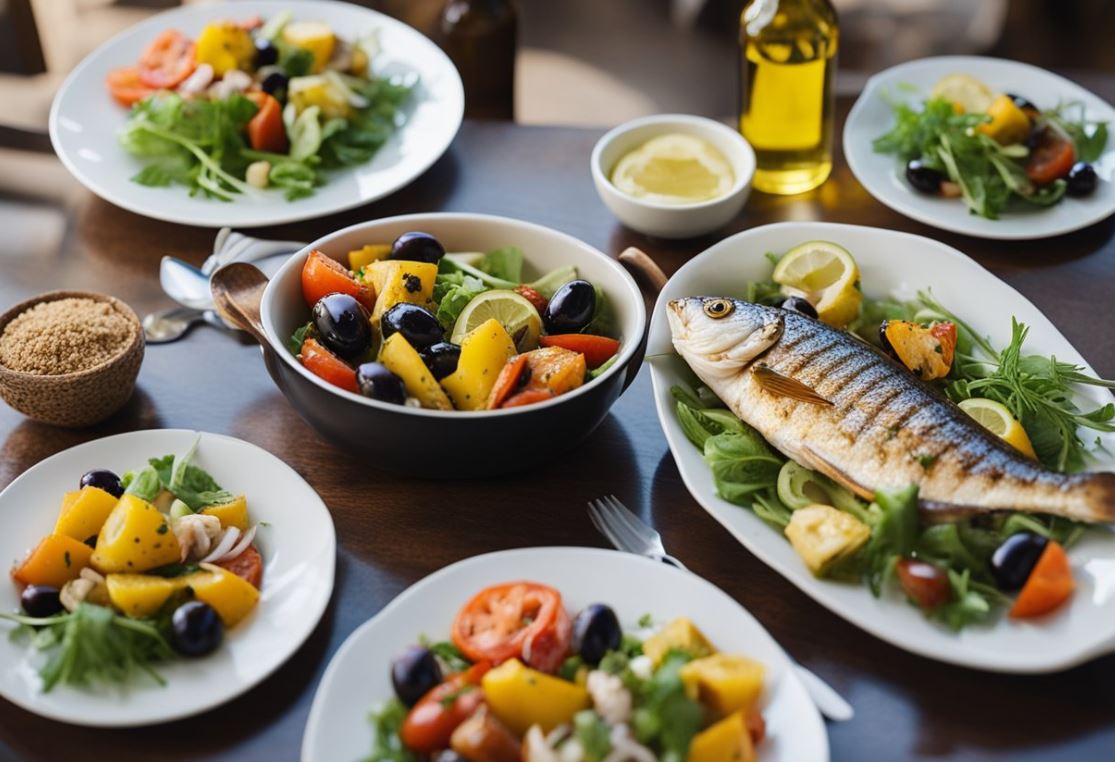The Best Fluffy Pancakes recipe you will fall in love with. Full of tips and tricks to help you make the best pancakes.

Quick Mediterranean-Diet Dinners: Healthy and Delicious Recipes
Whether you’re a busy parent, a working professional, or just someone who wants to eat well without spending hours in the kitchen, the Mediterranean diet has plenty of options to choose from. From classic Greek salads to hearty Italian soups to spicy Moroccan stews, there’s something for everyone. And with the right ingredients on hand, you can easily customize these recipes to suit your tastes and preferences. So why not give it a try? With these quick Mediterranean-diet dinners, you can enjoy delicious and nutritious meals without sacrificing flavor or convenience.
Benefits of the Mediterranean Diet
The Mediterranean diet has been widely recognized as one of the healthiest diets in the world. It is based on the traditional eating habits of people from the Mediterranean region and emphasizes the consumption of fruits, vegetables, whole grains, legumes, nuts, seeds, and olive oil, while limiting the intake of processed foods, red meat, and sweets. Here are some of the benefits of following the Mediterranean diet.
Heart Health
Research has shown that the Mediterranean diet can reduce the risk of heart disease. This is because it is rich in monounsaturated and polyunsaturated fats, which can help lower cholesterol levels and improve blood pressure. In addition, the diet is high in antioxidants, such as vitamins C and E, which can help prevent the oxidation of LDL cholesterol, a major contributor to heart disease.
Weight Management
The Mediterranean diet is also effective for weight management. It is low in saturated fat and high in fiber, which can help you feel full and satisfied while consuming fewer calories. In addition, the diet encourages the consumption of whole, nutrient-dense foods, which can help you maintain a healthy weight over time.
Diabetes Prevention
The Mediterranean diet has been shown to reduce the risk of type 2 diabetes. This is because it emphasizes the consumption of low-glycemic index foods, such as fruits, vegetables, and whole grains, which can help regulate blood sugar levels. In addition, the diet is rich in healthy fats, such as those found in nuts and olive oil, which can improve insulin sensitivity and reduce the risk of developing diabetes.
In summary, the Mediterranean diet is a healthy and sustainable way of eating that can provide numerous health benefits. By following this diet, you can improve your heart health, manage your weight, and reduce the risk of developing diabetes.
Essential Ingredients for Mediterranean Dinners

When it comes to Mediterranean cuisine, the ingredients used are the foundation of the diet. Here are some essential ingredients that will help you create quick and delicious Mediterranean dinners.
Olive Oil
Olive oil is the cornerstone of the Mediterranean diet. It is rich in healthy monounsaturated fats and antioxidants that are beneficial to the body. Use extra-virgin olive oil as a dressing for salads or as a cooking oil for sautéing vegetables and meats.
Fresh Vegetables
Fresh vegetables are a key component of the Mediterranean diet. They are packed with vitamins, minerals, and fiber that are essential for good health. Incorporate a variety of vegetables such as tomatoes, cucumbers, bell peppers, onions, and leafy greens into your meals.
Lean Proteins
Lean proteins are important for building and repairing muscle tissue. The Mediterranean diet includes fish, poultry, and legumes as sources of protein. Try incorporating grilled fish or chicken into your meals, or add chickpeas or lentils to salads.
Whole Grains
Whole grains provide the body with energy and are a good source of fiber. The Mediterranean diet includes whole grains such as brown rice, quinoa, and whole wheat pasta. Use these grains as a base for your meals or as a side dish.
Herbs and Spices
Herbs and spices are used in Mediterranean cuisine to add flavor and depth to dishes. They are also rich in antioxidants and have anti-inflammatory properties. Use herbs such as basil, oregano, and thyme, and spices such as cumin, paprika, and turmeric to enhance the flavor of your meals.
By incorporating these essential ingredients into your Mediterranean dinners, you can create quick and delicious meals that are not only satisfying but also good for your health.
Quick Mediterranean Dinner Recipes

If you’re short on time but still want a flavorful and healthy meal, these quick Mediterranean dinner recipes are perfect for you. With a variety of seafood, vegetarian, poultry-based, and one-pot wonder options, there’s something for everyone.
Seafood Dishes
Mediterranean cuisine is known for its delicious seafood dishes, and these recipes are no exception. Try making a simple yet flavorful garlic-lemon shrimp dish, or a classic Mediterranean grilled octopus. If you’re looking for something heartier, try a seafood paella with fresh mussels, clams, and shrimp.
Vegetarian Options
Vegetarians can also enjoy the flavors of the Mediterranean with these quick and easy recipes. A simple roasted vegetable dish with eggplant, zucchini, and tomatoes is a great option, or try a flavorful chickpea and spinach stew. For a lighter option, make a Greek salad with fresh vegetables and feta cheese.
Poultry-Based Meals
If you’re in the mood for chicken or turkey, these Mediterranean-inspired recipes are perfect. Try making a lemon and herb roasted chicken, or a flavorful turkey meatball dish. For something a little different, make a Moroccan-spiced chicken tagine with couscous.
One-Pot Wonders
For an easy and convenient meal, try making a one-pot wonder dish. A Mediterranean-style quinoa salad is a great option, or try a hearty lentil and vegetable soup. For something a little more indulgent, make a creamy feta and spinach pasta dish.
With these quick Mediterranean dinner recipes, you can enjoy delicious and healthy meals without spending hours in the kitchen.
Cooking Techniques for Speedy Meals
When it comes to preparing quick Mediterranean-diet dinners, the right cooking techniques can make all the difference. By choosing the right methods, you can cut down on prep time, reduce the number of dishes you need to clean, and still end up with delicious, healthy meals.
Grilling
Grilling is a great option for quick Mediterranean-diet dinners. Not only does it cook food quickly, but it also adds a delicious smoky flavor that pairs well with many Mediterranean ingredients. To speed up the grilling process, consider using a grill pan or indoor grill. These tools allow you to grill indoors, without having to wait for an outdoor grill to heat up.
Sautéing
Sautéing is another great option for quick Mediterranean-diet dinners. This cooking technique involves cooking food quickly in a small amount of oil or butter. To speed up the sautéing process, consider using pre-cut vegetables or thinly sliced meats. These ingredients will cook more quickly than larger pieces, reducing your overall cooking time.
Baking
Baking is a great option for one-pan Mediterranean-diet dinners. By combining all your ingredients in a single baking dish, you can save time on prep and clean-up. To speed up the baking process, consider using pre-cooked ingredients, such as canned beans or pre-cooked grains. These ingredients will cook more quickly than raw ingredients, reducing your overall baking time.
No-Cook Preparations
Finally, don’t forget about no-cook preparations when it comes to quick Mediterranean-diet dinners. Many Mediterranean dishes, such as salads and dips, require no cooking at all. By focusing on these types of dishes, you can save time and still enjoy delicious, healthy meals. To speed up the preparation process, consider using pre-washed and pre-cut ingredients, such as bagged lettuce or pre-cut vegetables.
By using these cooking techniques, you can prepare quick and easy Mediterranean-diet dinners without sacrificing flavor or nutrition. Whether you choose to grill, sauté, bake, or go no-cook, there are plenty of options to keep your meals exciting and delicious.
Meal Planning Strategies

Planning ahead is key when it comes to sticking to a healthy Mediterranean diet. Here are some meal planning strategies to help you save time and stay on track:
Weekly Meal Prep
Take some time at the beginning of the week to plan out your meals. This will help you avoid impulsive food choices and ensure that you have all the necessary ingredients on hand. Consider prepping some ingredients in advance, such as chopping vegetables or marinating meat, to save time during the week.
Using Leftovers
Don’t let leftovers go to waste! Use them to create new meals throughout the week. For example, leftover grilled chicken can be added to a salad or used to make a quick stir-fry. Roasted vegetables can be used as a side dish or added to a frittata.
Cooking in Batches
Cooking in batches can save you time and ensure that you always have healthy meals on hand. Consider making a big batch of soup or chili that can be portioned out and eaten throughout the week. You can also cook a large batch of grains, such as quinoa or brown rice, to use as a base for meals throughout the week.
By following these meal planning strategies, you can save time and ensure that you always have healthy Mediterranean meals on hand.
Dining Mediterranean-Style
When it comes to following a Mediterranean diet, not only is it important to choose the right foods, but it’s also important to adopt a Mediterranean-style of dining. Here are some tips to help you dine Mediterranean-style:
Setting the Table
When it comes to setting the table, keep it simple and elegant. Use a tablecloth or placemats, and opt for simple and classic dinnerware. Add a pop of color with a fresh bouquet of flowers or a bowl of fruit. Lighting is also important, so opt for soft, warm lighting to create a cozy and relaxed atmosphere.
Portion Sizes
In Mediterranean-style dining, portion sizes are smaller than the typical American diet. Use smaller plates and bowls to help control your portions. Fill half your plate with vegetables, one-quarter with protein, and the remaining one-quarter with healthy fats like olive oil or nuts.
Mindful Eating
Mediterranean-style dining is all about enjoying your food and being present in the moment. Take time to savor each bite, and engage in conversation with your dining companions. Avoid distractions like television or phones, and focus on the flavors and textures of your food.
By adopting a Mediterranean-style of dining, you can not only enjoy delicious and healthy meals, but also create a relaxing and enjoyable dining experience.



